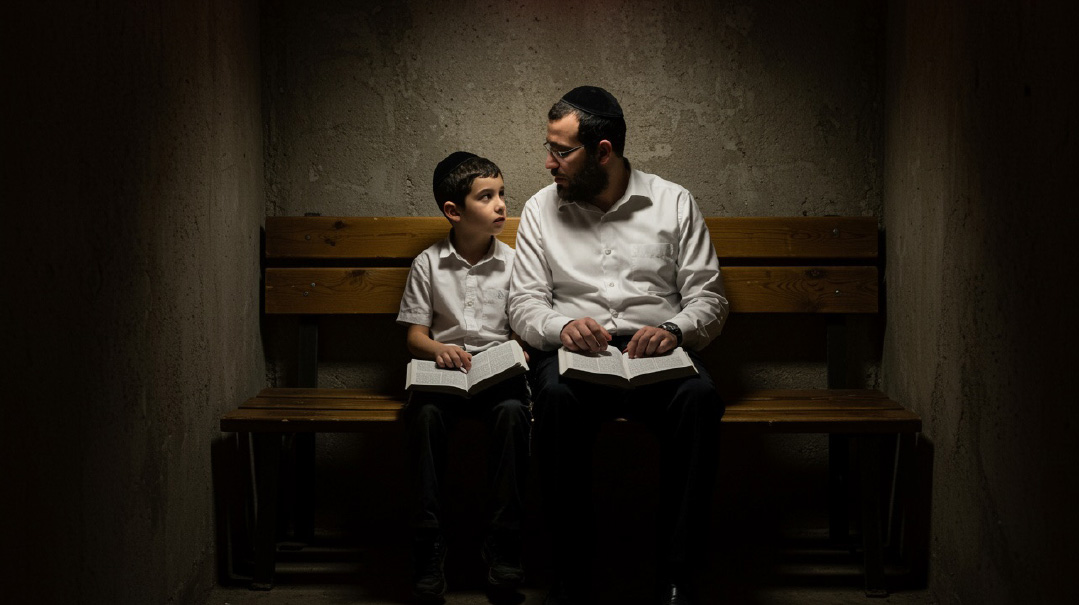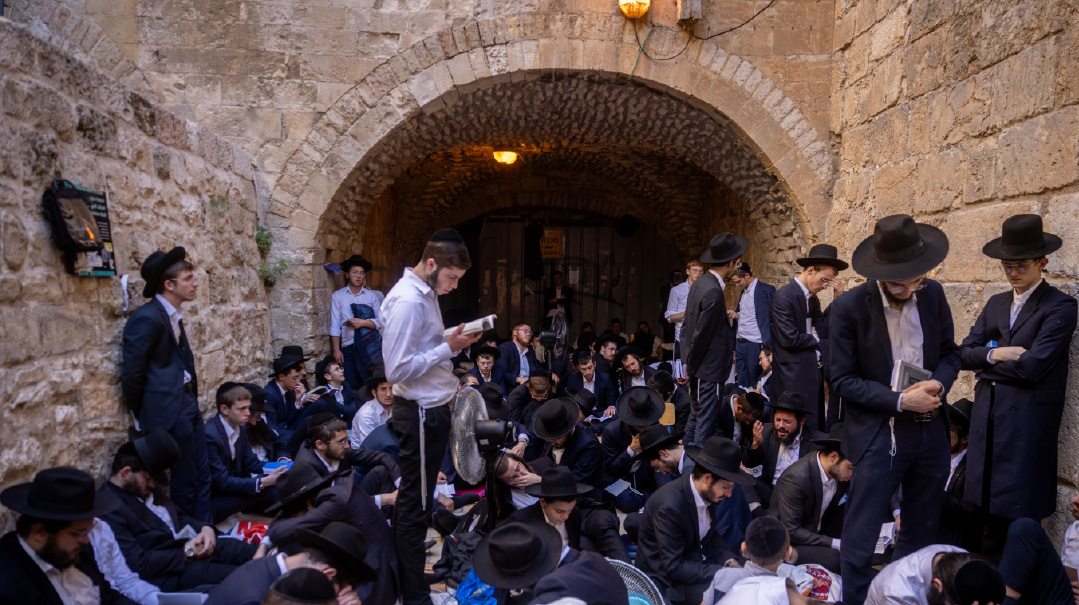Resetting the Tone
| June 24, 2025Why we are so challenged in understanding how to properly react to the war with Iran

F
or close to two weeks now, Israel has endured nonstop, painful, deadly ballistic missile attacks launched by the tyrannical Iranian regime. This has placed millions of our brothers and sisters in danger, wondering how long they can hold out.
Like you, I shudder when the Home Front Command reports an imminent ballistic missile attack on its way to the Holy Land. Like you, my heart aches for young children, the elderly, and the disabled who are wakened in the small hours of the morning to rush to the bomb shelters. Like you, I am pained by the pictures and videos of the collapsed buildings, shattered lives, cities in disarray, and first responders digging under rubble looking for signs of life, or worse.
As a result, I have received the following assortment of honest reactions and sincere questions:
“I can’t focus at all or get anything done — I have an uncontrollable desire to constantly check my phone to see the latest news.”
“What should I do? My children are between school and camp, and we planned a short getaway. Should we limit the fun activities?”
“I was planning on going out to dinner with some friends this week, should I cancel?”
“I feel lost and overwhelmed. What direction can you give me to make an impact above, in Shamayim?”
Before we answer these questions, let us first explore why we are so challenged in understanding how to properly react to the war with Iran. The Torah carefully details many intricate halachos for the soldier and army in the parshiyos of Shoftim and Ki Seitzei; however, it does not discuss how the noncombatants should behave. Seemingly nowhere in the Chumash or Neviim do we see how the civilian population should act when the Jewish nation is at war.
While the Rambam in Hilchos Melachim delineates the laws of war for the army, nowhere does he codify how civilians are supposed to behave during wartime. The Shulchan Aruch does not include a section about war. The Chofetz Chaim dedicates his entire sefer Machaneh Yisrael to halachos for a Jewish soldier in a non-Jewish army, but he does not record even a short passage about appropriate civilian behavior during war.
So we are left with a vexing question: What are the rules for how civilians should behave? What do Chazal expect civilians to do on the home front? The lack of clear directives leaves us feeling lost, confused, and out of sorts. What is our job?
If we take a much closer look, however, at parshas B’haalosecha, we find a clue.
When describing the occasions when the chatzotzros (trumpets) should be blown, the Torah writes (Bamidbar 10:9): “When you go to wage war in your land against an enemy who attacks you, you shall sound short blasts on the trumpets, and you shall be remembered before Hashem your G-d, and you shall be saved from your enemies.”
The mitzvah of sounding the trumpets when the Jewish nation is going to war is certainly not limited to military personnel; the entire citizenry would hear the blasts. Both the Rambam (Hilchos Taanis 1:1 and Sefer Hachinuch mitzvah 384) understand this pasuk as the source for civilian behavior during wartime. The Rambam explains that the purpose of the trumpets is to awaken a person to repent as a merit for success.
The Sefer Hachinuch writes, “At a time of trouble, a person needs great focus in his supplication before his Creator, that He should have mercy upon him and save him from his trouble.” The purpose of the trumpet blasts, Sefer Hachinuch teaches, is to help us focus and pay careful attention to the situation we are in.
If we carefully consider the parshah of the trumpets and the words of the Sefer Hachinuch, we will emerge with a new insight into our question. The Torah also commands us to blow the trumpets when offering a korban, to make us keenly aware of the importance of the moment and to focus properly — a korban can be disqualified by certain thoughts. Thus, the sound of the trumpet creates the atmosphere necessary to offer the sacrifice.
The trumpet blast similarly sets the tone, as it were, on the eve of battle: It generates an aura of “eis milchamah,” a time of war, a solemn period that also requires proper focus. Just like a korban requires a new level of awareness and attention, a heightened level of mindfulness and cognizance, so too does wartime. (See Maggid Mishnah on Rambam, Hilchos Taanis 1:1; and Pri Megadim, Mishbetzos Zahav, Orach Chayim 575:2)
The Torah is teaching us that wartime places the Jewish People in a different orbit; it can’t be business as usual. It necessitates consideration and reflection, thoughtfulness and teshuvah. In Talmudic times, it was cause for fasting and significant prayer, as described by the Rambam and Shulchan Aruch in their halachos of fast days. (See Shnei Luchos HaBris, Maseches Taanis, parshas Ner Mitzvah 19.) In our times, without the blasts of the trumpets, we don’t fast or have the defined tefillas rabim described by the Gemara. Instead, we recall the chatzotzros and commemorate their sound to refocus our attention and establish our wartime mind frame.
Let us now return to our original questions and attempt to outline proper wartime behavior for civilians. The Torah and Chazal never articulate what a civilian can or can’t do, because that is not the objective. The Torah’s approach is to create a new reality — to make us refocus and redirect our attention. It’s about hitting reset, to think and behave with a totally different focus. In Biblical times, the blasts of the chatzotzros created that reality. In Talmudic times communal fasting and prayer created that reality. In the galus, we have neither, and are forced to independently create that wartime reality.
For some, that may or may not include a vacation, a night out, or checking the news often. For others that may include added tefillah, Tehillim, and teshuvah. But whether or not these are permitted or suggested is not the question to be asking. The real question to ask is: What is my overall demeanor, my focus?
I always drive to work, but what is my focus during my commute when Israel is at war? It should be a different focus. I am often engaged in conversation, but what do I talk about when Israel is at war? It should be a different type of conversation. I always make brachos, but how do I do that when Israel is at war? It should be a different brachah. Likewise, our davening should be a different davening. A different focus. I regularly struggle to spiritually focus, now I will try. That’s a refocus!
But the choice resides with you. The options are available. The possibilities are endless. Only you can answer the question of how you should behave when our nation is at war. Only you know what your focus should be. Only you know the areas that require refocusing. Only you can decide what is appropriate to do or not to do at this wartime.
May we soon merit the day when the Torah promises (Bamidbar 10:10) we will hear the blast of the trumpets: “On your joyous occasions your festivals and your new moon days, over your elevation offerings and over your peace-offerings. They shall be a reminder for you before your G-d: I am Hashem your G-d.”
Rabbi Moshe Walter is the rav of Woodside Synagogue Ahavas Torah in Silver Spring, Maryland, and the executive director of the Vaad HaRabanim of Greater Washington.
(Originally featured in Mishpacha, Issue 1067)
Oops! We could not locate your form.







